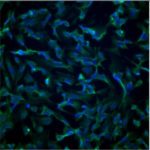Link to Pubmed [PMID] – 21548574
Biochemistry 2011 Jun;50(22):5058-66
Etoposide is a widely prescribed anticancer drug that stabilizes covalent topoisomerase II-cleaved DNA complexes. The drug contains a polycyclic ring system (rings A-D), a glycosidic moiety at C4, and a pendant ring (E-ring) at C1. Interactions between human topoisomerase IIα and etoposide in the binary enzyme–drug complex appear to be mediated by substituents on the A-, B-, and E-rings of etoposide. These protein–drug contacts in the binary complex have predictive value for the actions of etoposide within the ternary topoisomerase IIα–drug–DNA complex. Although the D-ring of etoposide does not appear to contact topoisomerase IIα in the binary complex, etoposide derivatives with modified D-rings display reduced cytotoxicity against murine leukemia cells [Meresse, P., et al. (2003) Bioorg. Med. Chem. Lett. 13, 4107]. This finding suggests that alterations in the D-ring may affect etoposide activity toward topoisomerase IIα in the ternary enzyme–drug–DNA complex. Therefore, to address the potential contributions of the D-ring to the activity of etoposide, we characterized drug derivatives in which the C13 carbonyl was moved to the C11 position (retroetoposide and retroDEPT) or the D-ring was opened (D-ring diol). All of the D-ring alterations decreased the ability of etoposide to enhance DNA cleavage mediated by human topoisomerase IIα in vitro and in cultured cells. They also weakened etoposide binding in the ternary enzyme–drug–DNA complex and altered sites of enzyme-mediated DNA cleavage. On the basis of these findings, we propose that the D-ring of etoposide has important interactions with DNA in the ternary topoisomerase II cleavage complex.

